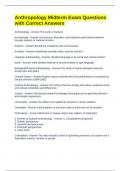Exam (elaborations)
Anthropology Midterm Exam Questions with Correct Answers
- Course
- Institution
Anthropology - Answer-The study of humans Archaeology - Answer-reconstructs, describes, and interprets past human behavior through analysis of material remains Artifacts - Answer-Something created by and used humans. Ecofacts - Answer-Something naturally made, used by humans. Linguistic...
[Show more]



